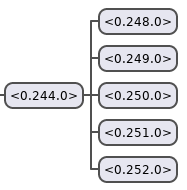More intcode computing! Without any modifications to the computer, and a quick search for an algorithm to make permutations, which, like, I just didn’t want to have to figure out, and I am ready to solve this.
defp permutations([]), do: [[]]
defp permutations(list),
do: for(elem <- list, rest <- permutations(list -- [elem]), do: [elem | rest])
Once my permutations are generated, all that’s left is to amp things up.
defp amplify([p], prog, i),
do:
run(prog, [p, i])
|> (&List.first(&1.output)).()
defp amplify([p | r], prog, i) do
o =
run(prog, [p, i])
|> (&List.first(&1.output)).()
amplify(r, prog, o)
end
defp run(program, input, output \\ []) do
program
|> Intcode.new(input, output)
|> Intcode.run_all()
end
Given a program and permutation of possible phase settings, run the 5
amplifiers, feeding the output of one into the input of the other. As there are
5! = 120 permutations that don’t affect each other, using
Task.async_stream/3 is a great reason to play with asynchronous processing.
It takes my list of permutations and runs each one as a task, streaming the
results to the next step in the pipeline. All that’s left is to find the highest
frequency.
def p1() do
input_stream()
|> Enum.at(0)
|> s1()
end
def s1(program) do
program
|> String.split(",")
|> Enum.map(&String.to_integer/1)
|> p(0..4, &lify/3)
end
def p(program, phases, f) do
phases
|> Enum.to_list()
|> permutations()
|> Task.async_stream(
fn frequencies ->
f.(frequencies, program, 0)
end,
timeout: :infinity
)
|> Enum.map(fn {:ok, i} -> i end)
|> Enum.max()
end
I made the timeout here :infinity just in case these jobs took a lot longer
than the default 5 seconds timeout (spoiler alert: they didn’t). That’s one
in the bag!
Puzzle 2
Feedback looping!? I can definitely connect inputs and outputs better. Hmm…
Processes are a fundamental part of Erlang and Elixir… I know! I’ll wrap my
computer in a process and send/2 and receive/1 messages between two
computers! I need to add a new input/2 that can handle if I’m supposed to
receive input from somewhere else.
defp input(%__MODULE__{program: prog, position: pos, input: :server} = computer, m) do
receive do
{:message, i} when is_integer(i) ->
%__MODULE__{computer | program: store(prog, shift(pos, 1), i, m), position: shift(pos, 2)}
{:output, o} when is_pid(o) or is_list(o) ->
input(%__MODULE__{computer | output: o}, m)
:halt ->
input(computer, m)
e ->
{:error, "Received #{e}"}
end
end
My computer can now handle 3 different messages: :message, :output, and
:halt. :message is used to send output from one computer that is meant as
input for another. :output is used to set the output of a computer to
something else (it gets used in the final solution). :halt is used to notify
the output that the computer has finally finished, but the intcode computer
doesn’t care about that, so I can loop and wait for a proper :message.
I need a new output/2 as well.
defp output(%__MODULE__{program: prog, position: pos, output: out} = computer, m)
when is_pid(out) do
send(out, {:message, parameter(m, Enum.at(prog, shift(pos, 1)), prog)})
%__MODULE__{computer | program: prog, position: shift(pos, 2)}
end
defp output(
%__MODULE__{program: prog, position: pos, output: [out | _rest] = output} = computer,
m
)
when is_pid(out) do
Enum.each(output, fn out ->
send(out, {:message, parameter(m, Enum.at(prog, shift(pos, 1)), prog)})
end)
%__MODULE__{computer | program: prog, position: shift(pos, 2)}
end
I check to see if the output is a PID or list of PIDs (again, for later),
and send it the output.
Finally, I need a new/1 that can accept setting the output, and a run_all/1
that will send the final :halt command.
def new(program, input \\ [], output \\ []),
do: %__MODULE__{program: program, input: input, output: output}
def run_all({:halt, %__MODULE__{output: o}}) when is_pid(o), do: send(o, :halt)
def run_all({:halt, %__MODULE__{output: [o | _r] = out}}) when is_pid(o),
do: Enum.each(out, &send(&1, :halt))
I think if I knew this is where I’d end up, all intcode computers would be run asynchronously with this message passing scheme.
The solution, then, is simply to wire up my computers to talk to each other and gather the output.
def p2() do
input_stream()
|> Enum.at(0)
|> s2()
end
def s2(program) do
program
|> String.split(",")
|> Enum.map(&String.to_integer/1)
|> p(5..9, &feedback_loop/3)
end
defp feedback_loop(frequencies, program, i) do
[f | frequencies] = Enum.reverse(frequencies)
last = Task.async(fn -> run(program, :server) end)
first =
frequencies
|> Enum.reduce(last, fn f, %{pid: pid} ->
t = Task.async(fn -> run(program, :server, pid) end)
send(t.pid, {:message, f})
t
end)
send(last.pid, {:output, [first.pid, self()]})
send(last.pid, {:message, f})
send(first.pid, {:message, i})
List.first(await_output())
end
defp await_output(o \\ []) do
receive do
{:message, i} when is_integer(i) -> await_output([i | o])
:halt -> o
_ -> await_output(o)
end
end
p/3 already runs everything in their own separate tasks, so setting the output
of the last computer to self/1 is actually setting it to the PID of the
asynchronous task. This makes each permutation run in its own isolated
environment. Then, await_output/0 loops, receiving output from the fifth
amplifier until it has halted, returning the last received number. I just have
to send the first amplifier its starting signal (0) to start the feedback loop!
A sample image, taken from Erlang’s process observer, is below. My task is the node on the left, while each of the 5 intcode processes is represented on the right.

All that’s left is to run it, and that’s for me
Conclusion
This one was pretty easy because the power of the OTP made it easy. It didn’t take too much extra code to add the ability to run these asynchronously and talk to each other.
